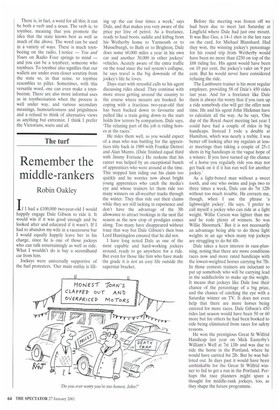Remember the middle-rankers
Robin Oakley
If I had a £100,000 two-year-old I would happily engage Dale Gibson to ride it. It would win if it was good enough and be looked after and educated if it wasn't. If I had to abandon my wife in a racecourse bar I would equally happily leave her in his charge, since he is one of those jockeys who can talk entertainingly as well as ride. What I wouldn't do is buy a secondhand car from him.
Jockeys were universally supportive of the fuel protesters. 'Our main outlay is fill
ing up the car four times a week,' says Dale, and that makes you very aware of the price per litre of petrol. As a freelance, ready to haul boots, saddle and kitbag from his Wetherby home to Yarmouth or to Musselburgh, to Bath or to Brighton, Dale does some 60,000 miles a year in his own car and another 30,000 in other jockeys' vehicles. Acutely aware of the extra traffic on the road since the rail system's collapse, he says travel is the big downside of the jockey's life he loves.
Days start with stressful calls to his agent discussing rides ahead. They continue with more stress getting around the country to the course where mounts are booked. So coping with a fractious two-year-old that has been backed down to favourite and pulled like a train going down to the start holds few terrors by comparison. Dale says, 'The relaxing part of the job is riding horses at the races.'
He rides them well, as you would expect of a man who was battling for the apprentices title back in 1989 with Franlcie Dettori and Alan Munro. (Dale finished equal third with Jimmy Fortune.) He reckons that his career was helped by an exceptional bunch of apprentices who were around at the time. This stopped him riding out his claim too quickly and he worries now about bright young apprentices who catch the media's eye and whose trainers let them ride too many winners on all-weather tracks through the winter. They thus ride out their claims while they are still lacking in experience and don't have the advantage of the 31b allowance to attract bookings in the next flat season as the new crop of prodigies comes along. Too many have disappeared without trace that way but Dale Gibson's then boss Lord Huntingdon ensured that he did not.
I have long noted Dale as one of the most capable and hard-working jockeys around, ready to go anywhere for a ride. But even for those like him who have made the grade it is not an easy life outside the superstar bracket. Before the meeting was frozen off we had been due to meet last Saturday at Lingfield where Dale had just one mount. It was Bee Gee, a 14-1 shot in the last race on the card, for Michael Blanshard. Had they won, the winning jockey's percentage for his round trip from Wetherby would have been no more than £250 on top of the £68 riding fee. His agent would have been on 10 per cent, the jockey's valet on 9 per cent. But he would never have considered refusing the ride.
The Lambourn trainer is his most regular employer, providing 58 of Dale's 450 rides last year. And for a freelance like Dale there is always the worry that if you turn up a ride somebody else will get the offer next time. He and his agent John Hickman have to calculate all the way. As he says, 'One day of the Royal Ascot meeting last year I could have had a couple of rides in big handicaps. Instead I rode a double at Hamilton, which was nearly a treble. I was better off looking after my regulars at lesser meetings than taking a couple of 25-1 shots in big handicaps in the vague hope of a winner. If you have turned up the chance of a horse you regularly ride you may not get back on it if it has run well for another jockey.'
As a light-boned man without a sweet tooth, and one who swims and jogs two to three times a week, Dale can do 7st 121b without too much trouble. He corrects me, though, when I use the phrase 'a lightweight jockey'. He says, prefer to call myself a jockey who can ride at a light weight. Willie Carson was lighter than me and he rode plenty of winners. So was Willie Shoemark.' But it is not necessarily an advantage being able to do those light weights in an age when many top jockeys are struggling to do 8st 41b.
Dale takes a keen interest in race-planning, noting that there are more conditions races now and more rated handicaps with the lowest-weighted horses carrying 8st 71b. In those contests trainers are reluctant to put up somebody who will be carrying lead in the saddlecloths to make up the weight. It means that jockeys like Dale lose their chance of the percentage of a big prize, and the chance of catching the eye with a Saturday winner on TV. It does not even help that there are more horses being entered for more races. Dale Gibson's 450 rides last season would have been 50 or 60 more but for others he had been booked to ride being eliminated from races for safety reasons.
He won the prestigious Great St Wilfrid Handicap last year on Mick Easterby's William's Well at 7st 131b and was due to ride the horse in the Portland, where he would have carried 8st 21b. But he was balloted out. In days past it would have been unthinkable for the Great St Wilfrid winner to fail to get a run in the Portland. Perhaps the race planners might spare a thought for middle-rank jockeys, too, as they shape the future programme.






















































































 Previous page
Previous page